Latest posts by Devin McKinney (see all)
- What John Lennon Thinks of Donald Trump - November 14, 2016
- The Meaning of Fun: The Paul is Dead Rumor - February 3, 2016
- BEATLES-STREEP-SHEA SHOCKER: IT’S NOT HER!!!! - August 13, 2015
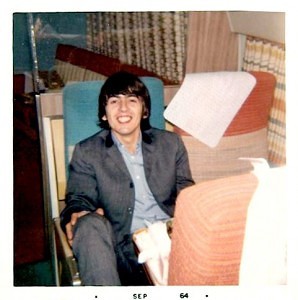 HEY DULLBLOG • He’d have been 71 today.
HEY DULLBLOG • He’d have been 71 today.
All the world is birthday cake, so take a piece, but not too much.




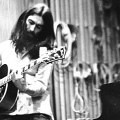
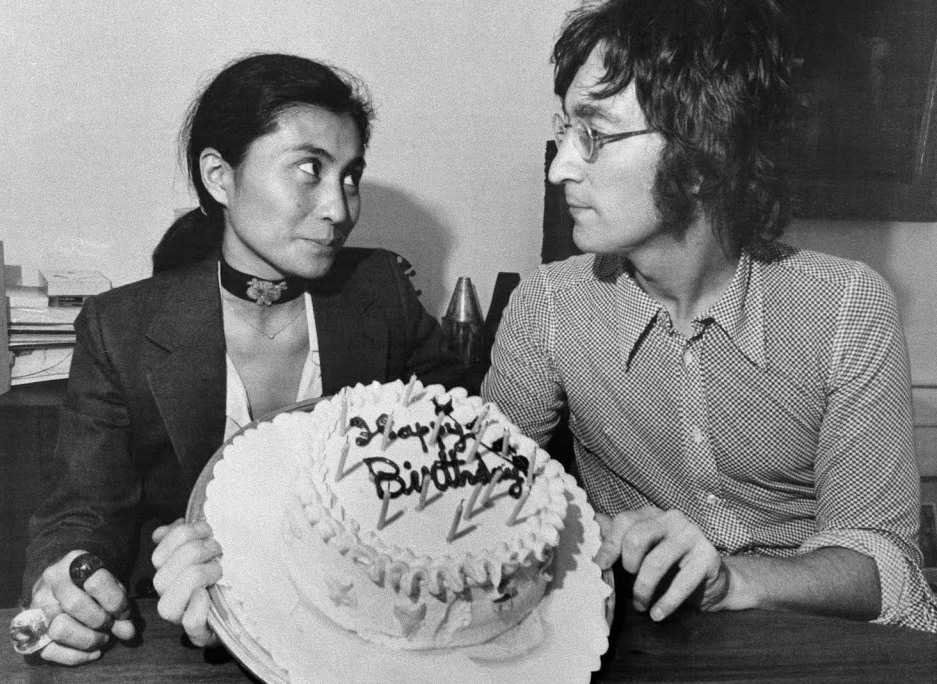
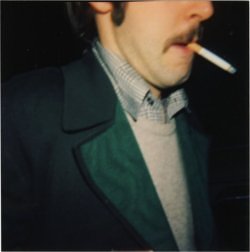

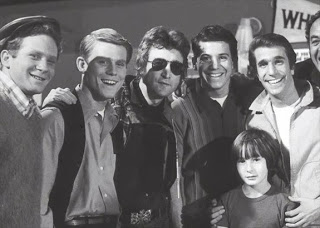
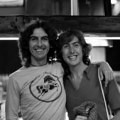
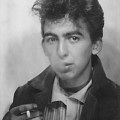
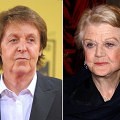
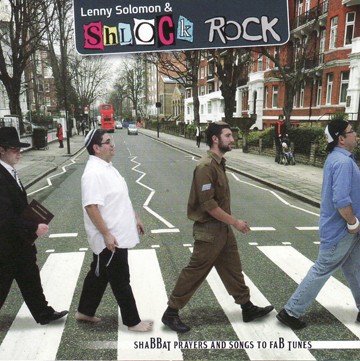
It’s Georgie’s birthday, it’s Georgie’s birthday – and we would like to wish him all the very best.
Great observation about George here from Alice Cooper, and about the Beatles in general (I think he’s right about Jeff Beck too):
http://www.guitarshoptv.com/video-alice-cooper-talks-about-jeff-beck-george-harrison/
Interesting how Lennon and McCartney are seen as artists in different leagues, separated from George and Richie.
JL-POB is way ahead of mid-class work from Lennon: Imagine, Mind Games, Walls and Bridged and Double Fantasy. The best work of Harrison, All Things Must Pass, Living In The Material World and Brainwashed equals or comes close to the league of JL-POB.
George’s Cloud Nine and a few of his best seventies albums are in the mid-class range of Lennon’s work.
Let us however not forget Lennon was unable to produce groovy pop-rock work from The Traveling Wilburys, except for a few songs.
I adore the typical Lennon albums like Sometime In New York, Rock ‘n Roll, and Live In Toronto. McCartney has a few of a similar kind of work: Run Devil Run, Electric Arguments, McCartney 1 and 2, his Russian album and a few others. Too bad Harrison never tried to produce special stuff.
His production work however is amazing. Check Brainwashed and then go back to the two Splinter albums.
Focussing on the post-Beatles work Harrison’s is hardly worse than Lennon.
Just one man’s opinion, but I like Harrison’s solo work much better than I like Lennon’s. POB is magnificent but unlistenable-to-for-pleasure; All Things Must Pass is both personal and pleasurable.
There are very few Lennon solo records that wouldn’t be improved by having Paul and the other Beatles on them, but I can’t say that about George’s work. Because George was quite often on his own inside the Beatles, I think he was better prepared for solo life. George’s collaborative instinct and (relative) lack of ego really shows, whereas both John and Paul were really hindered by being ex-Beatles.
Ha ha now you’ve opened pandora’s box Michael.
Let’s face it, Macca’s ego as composer was already a problem within the Beatles, and most likely at the latest during the recording of Revolver. As composer he claimed the right to determine any arrangements of his songs, even prohibiting others a contribution they were entitled to as band-members. Since Tune In, I see this more or less as unavoidable, composer capacities by John and Paul were the reason the Beatles existed within the recording industry.
U2 is much more a band than The Beatles. I think this Macca behavior was not good for the longevity of the band… My guess is that it has played a role in the failure of The Beatles, as significantly as the stupid drug addiction and weakness john lennon brought at the table, in the late sixties.
However I think Paul’s typical solo work is huge and very very interesting. whether it is the collaboration with ex-Nirvana members, the Kissing Bottom album, but also his two McCartney albums, Run Devil Run, the almost jam-like songs on Flaming Pie and Tug of War, his Electric Arguments stuff… It all excentric typical Paul rock’ roll or over the edge stuff, somewhat experimental, or at least challenging to the weary pop ears.
I dunno how that would have spunded within The Beatles context. once they were a rock ‘n roll band within the studio, up until Beatles for Sale, than they became studio wizards and lost spontaneity. McCartney tried it with The Get Back project, look and listen to the roofttop concert and see how succesful it was, and how the album could have been.
In a similar way I think Yoko tried with ‘Double Fantasy stripped bare’ what Macca was doing all along, both his little ditties about fun in the waterpond and other nature oriented songs, …
I think it’s more tragic than that, @Rob.
Paul’s ego and overstrong sense of aesthetics was only a problem if he restricted himself to Beatle-only releases. The obvious answer is solo albums, so the obvious question is: why not? I think it’s two-fold.
1) “The Family Way” doesn’t seem to have been a big hit, or enough fun to justify more. If everything you release with The Beatles is a hit, and you start releasing solo stuff that does less well…that’s a huge shot to the ego. I don’t think Paul wanted to risk it, not with John post-68 all too willing to cut him down.
2) I think, out of the four of them, Paul loved being a Beatle the most. It was, ironically, Paul’s love of the group that exacerbated the tensions within it. Lennon’s sabotage was the deciding factor, but Paul’s holding…on…tighter made a solution impossible.
Pandora’s box indeed, how much is written about the destructiveness of Paul McCartney unable to create a collective after 1966? He has that we-sense and ability apparently in his bones, otherwise, my guess only, he wouldn’t have been able to create the family bonding as he did with Linda.
You are much more explicit in putting a lot of blame in Paul’s lap. I am unsure about what would have happened if Paul would have been more willing to allow more involvement of the others in the arrangements, but even more so what would have happened if George would have been granted more space in his changing guitar style and compositions. What exactly was it that made Lennon wholly unsupportive for the George Harrison songs that were chosen to be included in the recording process for Beatles-records – why oh why?
I think that the guitarsounds and style George put on display on Living In The Material World is utterly brilliant and beautiful, something none of the other Ex-Beatles was ever capable of. The climax of this style came with Brainwashed, so very very beautiful, elegant, complex yet subtle, and gorgeously moving. Goose bumps and tears in my eyes.
Where was George going with his guitar sound in and from 1968? At that time he had this complex and ferocious style from ‘Old Brown Shoes’, but was capable to produce the grand beauty of ‘Something’.
Which sounds are George’s on ATMP, which from the other well playing guitar gods, Clapton and Mason? Looking back from years later one would suggest the slide-guitar sounds are basically George’s. But hell, he was only introduced to that style and sound when he participated in the European tour of Delaney & Bonnie’s rock ‘n soul band late 1969. How fast did this perfectionist beyond believe learn to master the technique and sound.
I am eager to dig into what musicologists and guitar-researchers present if they would analyze and describe the sound and style of George’s guitar work.
Rob, I was responding only under the terms of the earlier comment. Though there were many other factors, I think BY FAR the biggest factor in the breakup of the group was Lennon’s post-Maharishi breakdown in early ’68, his descent into heroin use by summer of ’68, and his exchanging a family who was firmly within the Beatles narrative (Cyn and Julian) for one who considered the Beatles a rival for his affection (Yoko). Whatever the others did or did not do, John Lennon systematically sabotaged the group after the return from India…something I think he regretted as early as 1971 (when Paul’s lawsuit made it clear what a breakup would really mean), and certainly later.
I think not supporting George’s recorded songs was an instance of this sabotage; I think squeezing out George’s material was, too. John Lennon was nothing if not an excellent judge of pop music, and it’s impossible for me to think that he listened to many of the songs on ATMP and did not see their potential.
Because George was quite often on his own inside the Beatles, I think he was better prepared for solo life. George’s collaborative instinct and (relative) lack of ego really shows, whereas both John and Paul were really hindered by being ex-Beatles.
Agree that George likely had a smoother transition into his solo career, largely because he didn’t take the shrapnel of an exploded codependency like John and Paul suffered upon losing each other. Not sure that that evinces a lack of ego so much as a lack of… codependency? I sense George had the most stable upbringing (and maybe the healthiest biochemistry) out of the Beatles, which would square with his (very sane) repudiation of the Beatlemania insanity. Quite quickly, even before the first blush of success had faded, he began saying “fame and money aren’t worth this.” Whereas I think John/Paul/Ringo had deeper voids to be filled, and so were more willing to do whatever, endure whatever, sacrifice whatever it took to get the attention/validation/security/power of fame and wealth.
Mike (& others), in what way would you say did George and Ringo “contribute” to the Beatles’ end? Was it more than being the first ones to leave (temporarily), and firmly taking John’s side in the Klein/Eastman management debacle?
I think that’s the main thing, @Velvet. I think their siding with John re: Klein was HUGE. And I think John worked very hard to politick them, based on how he treated George after the breakup. Ringo would’ve gone with either side, so who George wanted was the key in that decision, and post-Yoko John seems to have only been friendly to George when it suited his interests.
I think George’s general resentment of the scale of the Beatles, fan intrusion into his life, and so forth, also tipped the scales towards breakup. But even he could be positively McCartney-like in his appreciation of what they had. The breakup was complex–here’s an earlier post on it–and I don’t think it was undertaken rationally, but emotionally, by a Lennon under great psychological stress; and even then, I do not think, in his heart of hearts, he expected it to be permanent. I think Paul’s lawsuit took him by surprise, which was why it made him so angry; but out of the four of them, John Lennon was the one for whom the signing of the 1974 dissolution papers does not seem to have been a moment of joy. For Paul and George, it most definitely was.
Lewisohn’s book makes it clear that Paul had strong reservations about Brian Epstein in the early days, and even tried to sabotage his management by picking fights, failing to turn up to important meetings, etc. Brian’s own book says similar things in a politer way. I imagine that when Klein came along, John and George were saying to each other, “Remember what Paul was like with Brian at first? He was wrong then, and he’s wrong now”. I think that’s why they were so adamant about Klein, and why Ringo went along with them.
Perhaps, @Dan, but by ’68-’69, Klein’s previous clients (the Stones) had soured on Klein and were warning the Beatles against him. There’s no mystery as to what Allan Klein was: a typical showbiz sharpie. The same brain that would negotiate a better contract seems to–eventually–always screwed his clients. This type of personality is (sadly) really common in the entertainment business, and Brian Epstein’s NOT being that is too seldom brought up. Would Seltaeb worked out better if Brian had made ten times the money, and kept it all for himself? ‘Cause that’s the more likely alternative. It was Brian’s very gentlemanliness–his “naivete”–that protected the Beatles in some sense.
So Klein’s a no-good. At the same time, one can understand (particularly given the climate of the group post-Yoko) that hiring Paul’s father-in-law wasn’t going to be a workable solution, either. Even so, I find it difficult to fault Paul too much in this situation, given John’s general flakiness and heavy drug use; it’s only natural with a partner like that, you’d want the extra security of being managed by someone related to you. That is the time-honored goal for a creative person.
To make a lot of money in showbiz and die penniless, you have to be a specific kind of person: have poor business instincts, and have either a lack of self-knowledge or a surfeit of ego, so that you don’t realize your flaw. John Lennon was precisely this type of person, whereas Paul McCartney is quite shrewd, so I think it’s pretty clear that 1) Klein was exactly the wrong person to manage the Beatles after Brian’s death, and 2) had McCartney not sued, the Beatles would’ve ended up like the Stones, and some or all of the Beatles catalog would have passed to ABKCO. Though it’s understandable that John, George, and Ringo balked at the Eastmans, there was never any danger of them doing anything detrimental to the Beatles, only things too favorable to Paul…and since Paul was in 1969 what he remains today, the primary defender of the Beatles’ legacy (musical and otherwise), as a fan I think the Eastmans’ would’ve been the much better course of action.
Here’s an article by John McMillian on Klein, that tells all that needs be told.
Marianne Faithfull likewise remembers Jagger speaking positively about Klein to the Beatles, only she alleges that he did it false-heartedly. “Mick’s strategy in dealing with Allen Klein was fairly diabolical,” she wrote. “He would fob Klein off on the Beatles. Mick called up John Lennon and told him, ‘You know who you should get to manage you, man? Allen Klein.’ And John, who was susceptible to utopian joint projects such as alliances between the Beatles and the Stones said, ‘Yeah, what a fuckin’ brilliant idea.’ It was a bit of a dirty trick, but once Mick had distracted Klein’s attention by giving him bigger fish to fry, Mick could begin unraveling the Stones’ ties to him. It was just a matter of time before the relationship was severed.”
I never much cared for Mick, and this article made me loathe him even more.
@ Michael this response to your ‘responding only in terms of the earlier comment’ (http://alturl.com/mb7i4, can’t find a reply button on this machine/OS)
I see, value and respect your points about Lennon’s destructive drugs abuse and emotional rollercoaster that rendered others powerless, as you explained in “a-momentary-lapse-of-reason” http://alturl.com/e6rrn
I can’t recall a lot ‘said’ about Paul’s negative contributions to the functioning of the band, and its consecutive creative dissolution.
Interesting and sad at the same time though, how we moved away from George’s work toward again John and Paul.
Rob, I moved away because I didn’t quite understand what you were saying about George’s work, and was writing in haste, not because I don’t think George is fascinating. He is!
John and George seemed especially burdened by the weight of unwanted baggage that came with ‘being a Beatle’, not in the context of within the band as a group of musicians but everything outside of it. I think both of them were genuinely traumatised by the mania, George especially. I also think both were conflicted – I believe they actually enjoyed being in the band, despite the irritations; but being a Beatle and everything that came with it was just too much weight to comprehend, let alone carry.
Paul, meanwhile, for whatever reason, didn’t seem to suffer in the same way, and I think he came to represent to John and George what ‘being a Beatle’ meant. As a result of this and, no doubt, Paul’s possessiveness over the product (which seemed to affect even Ringo), he became the target for their frustrations. I think they conflated the pressures of being a Beatle with playing in the Beatles – perhaps inevitably – to the extent where the only way out they could see was not playing in the Beatles any more.
In summary, who broke up the Beatles? John, Paul, George and Ringo. *cough, and Yoko, ahem*
“There are very few Lennon solo records that wouldn’t be improved by having Paul and the other Beatles on them, but I can’t say that about George’s work. Because George was quite often on his own inside the Beatles, I think he was better prepared for solo life.” Sorry Michael, I can’t agree with that. Look at George’s Beatles songs. Taxman is a better song because of Paul’s lead guitar solo and bass line. Something is a better song because of Paul’s bass line. While My Guitar Gently Weeps is a better song because of Paul’s bass line which provides the drive of the song and allows Eric to get all melodic on his guitar solo.
And for me the problem with much of George’s solo work after All Things Must Pass is its sheer uniformity. There are no surprises musically, no risk-taking. The same-y-ness of George’s solo work makes it comfort food for people who like it. You know exactly what you’re getting with a Harrison solo album. But for people who aren’t big on George’s style, the same-y-ness makes his music something that could never be said about Beatles music: boring.
One other point. It wasn’t just Paul who was running the show production wise. It was George Martin. This idea that Paul was somehow telling everyone what to do ignores how much influence George Martin had. And part of the reason that George’s songs got “held back” early on wasn’t because of Paul. It was because George Martin thought George’s early songs were “rubbish” as he was quoted as saying only a year ago.
I think All Things Must Pass shows George at his finest. But after that, he could have really used Paul and George Martin to spice up his music. Just my 2 cents.
I’m sorry, @Drew–you misunderstood. I didn’t mean that George was totally unsupported while a Beatle; all the examples you name are wonderful ones. And I’d go further: of the three songwriting Beatles, George’s songs brought less (often MUCH less) to the table before 1968. Taxman, for example, benefits from Lennon’s lyrical help, too.
But two things:
1) Many of the songs on ATMP were written during the Beatle years. When they were recorded, they formed the best-selling Beatle solo LP ever (right? somebody check me). And yet they never found their way onto any Beatle albums. This is peculiar, and runs against the Beatles’ standard operating procedure of “best idea wins.” Even more blatantly, John began to absent himself whenever they would record George songs. If this isn’t being “quite often on his own inside the Beatles,” I don’t know how else to say it.
2) During this same solo-while-still-a-Beatle period, George showed a gift for collaboration that neither John nor Paul showed in their post-Beatles career. George brought in Clapton, and Billy Preston, because the two lead dogs, John and Paul, were increasingly at each other’s throats. That’s a pretty savvy move; not only did it give us “Weeps,” but it also saved the Get Back/LIB sessions. When ex-Beatles worked with big-name collaborators–Lennon with Bowie and Elton and Cheap Trick; McCartney with Elvis Costello, Harrison with Clapton and Dylan and the Wilburys–the product was very good. And yet out of the three, George did that by far the most; and I would contend that was because he’d been less supported within the Beatles, more psychologically on his own for longer, so when it came time to be a solo artist, George knew how to do it better than Paul or John. But YMMV.
“And for me the problem with much of George’s solo work after All Things Must Pass is its sheer uniformity.”
I would agree with this; even ATMP is a little same-y-same to my ears. Solo George Harrison is, for me, a Greatest Hits affair.
But when I listen to “The Light That Has Lighted The World,” for example, I don’t think hear a John- or Paul-shaped hole in it. Whereas John and Paul’s best solo stuff always feels like a great song that could’ve been transcendent with the other guy on it, as well. Providing the middle eight, or more musical ideas, or acidity where there’s too much sweetness, or musical invention where things are underdeveloped. Beatle or solo, George is George. But solo John and Paul is, often, to me, potentially great work defaced by ego and circumstance.
It was because George Martin thought George’s early songs were “rubbish” as he was quoted as saying only a year ago.
And yet George’s “Don’t Bother Me” was good enough for George Martin to include in his solo “Off The Beatle Track” instrumental album released in 1964!
I like even the earliest Harrison compositions. “I Need You” from the HELP! soundtrack was good enough for America to rip off (“I need you, like the flower needs the rain”) and “Don’t Bother Me” was covered beautifully by the Smithereens. If there had been no John back in an alternate-universe Liverpool, Paul and George might have formed a creatively profitable partnership. I don’t know how much George contributed to “In Spite Of All The Danger” but I’m guessing he wrote the “I’ll keep all the others from knocking at your door” line, because it sounds like George.
I love “In Spite of All the Danger.” It’s much better than “Love Me Do,” better than several other early Beatles tracks, in fact. It’s a damn shame they never recorded and released it officially.
Hologram Sam: FYI, in Mark Lewisohn’s book, he reports that In Spite of All the Danger is really just a McCartney song. George Harrison’s contribution was the guitar solo, because, Lewisohn says, Paul mistakenly thought that he was supposed to give George a song credit for that bit, which isn’t the case (if it was, Paui would deserve a songwriting credit for the Taxman solo). Anyway George Martin didn’t say every single one of George’s early songs were “rubbish,” just that most of them were. Clearly Harrison developed later as a songwriter later than John and Paul. Nothing wrong with that.
Thanks, Drew. I didn’t know that. I’ve told myself before not to trust songwriting credits, but I didn’t follow my own advice. I wonder if “Cry For A Shadow” also is just a lead guitar credit.
The Beatles’ original material was so great, that even young George’s early, not yet fully developed songwriting is more interesting than a lot of the early ’60s stuff being written by seasoned professionals for the brylcreemed and v-neck sweater heartthrobs.
John’s solo work after Imagine is pretty dire. So yes, I agree he needed Paul. But I don’t see that Paul needed John all that much. Ram is brilliant without John. Band on the Run is a great record without John. Venus and Mars is a good album without John. McCartney II is Paul’s experimental weirdness and it’s great without John, whereas John’s 2 experimental records are unlistenable. Could Paul’s solo albums in the 70s have been even better? Sure, some of them. But George’s albums could have been a lot better too if he’d had Paul and John to push him out of his comfort zone.
But the problem with all of those McCartney solo records I mentioned from the 70s is not that they weren’t great. It’s that a small pool of Lennon-obsessed rock critics in the 70s who controlled the music zeitgeist at the time went after Paul’s work in a big way. They did it for personal reasons, IMO, blaming Paul for the breakup. But they also took John’s side because John’s political activism made music “important” in society and thus made music critics “important.” Also, those critics were unable to accept that Paul was producing work that didn’t fit with their preconceived notions about pop and rock.Those same critics attacked Abba, Chic, Queen, and all sorts of great pop artists who are now much more critically respected than they were in the 70s when the music police were deciding who was “authentic” and who wasn’t. Its only in recent years that you have a new, younger group of critics — unbiased by any attachment to 60s politics — that has realized that Paul produced some really unique excellent work in the 70s. We now are at a point where I see people say Ram is the best solo album by an ex-Beatle and that statement is taken seriously; in the 70s you would have been ridiculed for making that argument. Of course in the 80s Paul entirely dropped the ball by following John’s Double Fantasy album down the road of adult contemporary mush and producing a lot of mediocre-to-awful work (aided by George Martin) but that’s another post. 🙂 Can you tell I really hate most of Paul’s 80s/90s solo work. THAT is when Paul fell apart artistically, brought on, IMO, by the death of John Lennon. Paul floundered, musically, for a very long time after John’s death.
As for the Beatles ability to collaborate: It’s funny. John was the toast of the town after the Beatles broke up and could have collaborated with anyone yet he rarely did. He always said it was because he only wanted to collaborate with Yoko. But he and Yoko didn’t collaborate on music all that much. She did her music. He did his. So why didn’t John collaborate more with Bowie, with Elton, and with any number of rock stars who were sucking up to him back then? Was he too insecure? Was it too much pressure to live up to being great? Was he protecting his partnership with McCartney? Who knows?
And Paul would have LOVED to collaborate in the 70s with big names. But he was a pariah in many ways. A guy who sues his bandmates doesn’t endear himself to other musicians. I think also Paul isolated himself because he too thought he was a pariah. I think he woried that if he approached anyone to collaborate, he’d be turned down and that would be too embarrassing. That’s how he ended up with Denny Laine and a bunch of other down-on-their-luck musicians. Prior to the Beatles’ breakup it was Paul who was the collaborative Beatle — writing songs for other artists, showing up in studios to play for various artists. I think once Paul lost the mantle of the Beatles, he had a crisis of ego and didn’t think he was wanted anymore since he’d been cast as the villain of the piece.
In recent years, Paul has showed he can collaborate with anyone. But collaboration doesn’t mean it’s always lovey-dovey and sweetness. In fact, Paul seems to be an artist who likes to push and be pushed back. He and Radiohead producer Nigel Godrich had a bit of a contentious relationship but it produced a great album in 2005. And Paul’s work on his Fireman albums with Killing Joke’s Youth has been a collaboration that’s lasted more than a decade and produced strong critically praised albums.
As for George, given that John and Paul were perceived as the titans of the Beatles, it was much easier for George to collaborate with outside musicians. The expectations would have been a lot lower on George. It would have been much much harder for John and Paul, on whom there would have been this pressure to be great. That’s why John and Paul missed each other so much, artistically — because when they worked together they could be open with each other, make mistakes, bring out weak material to be improved, and not feel this pressure to be brilliant. Can you imagine how it would have felt for John or Paul to be in a room full of musicians staring at either of them, waiting to see this brilliance on display. The pressure would have been enormous. How can you bring out a half-finished song that needs work when you feel like everyone around you is expecting everything you do to be brilliant?
Just my random thoughts. 🙂
I recently went to hear a live performance of “All Things Must Pass,” which confirmed both my love of aspects of that album (several great, heartfelt, uniquely Harrison songs) and my dislike of others (the mostly unvarying tempo and subject matter). One of the band members joked that “we know there are folks coming later just for the Apple Jam section.”
They didn’t actually play the jam, slotting in “It Don’t Come Easy” where it would have started. And THAT was interesting: the energy level in the place went from respectful attention to happy dancing in seconds. A little Ringo went a long way toward varying and lightening the mood.
even ATMP is a little same-y-same to my ears. Solo George Harrison is, for me, a Greatest Hits affair.
Yes. I feel the same about solo John and Paul, actually, with the notable exceptions of Plastic Ono Band, McCartney I & II, Ram, and Electric Arguments. All the other solo albums get sold for parts to my mixed playlists.
John and Paul made such a huge mistake in giving George short shrift — musically of course, but the consequences were even more dire on the Band Spirit front. Insert a happy, heard, fulfilled George into the early breakup period, and I think quite possibly you prevent (or at least delay, or soften) the breakup.
Paul would have LOVED to collaborate in the 70s with big names. But he was a pariah in many ways. A guy who sues his bandmates doesn’t endear himself to other musicians. I think also Paul isolated himself because he too thought he was a pariah. … Prior to the Beatles’ breakup it was Paul who was the collaborative Beatle
Those are interesting points. I think the breakup acrimony did traumatize Paul, relationship-wise, if that makes any sense. It must have been agonizing to have your closest friends — the one sure safety net under the pressures of Beatlehood — decide you’re crap and publicly gang up on you. (I’m reminded of Pete Townshend saying that it was always Linda who made the call, because “it wouldn’t occur to Paul that his friends wanted to talk to him.”)
That said I definitely think George had a better or more natural collaborative spirit. He didn’t feel the need to be top dog, whereas I think Paul does on some level. To his credit Paul also likes working with people who push back (that’s true in his personal relationships as well). But George was able to bring disparate people together and then step back and and let the chemical reaction bloom on its own into something awesome, and that’s quite a gift. Anybody who can unite Dylan with Orbison in a songwriting partnership has my admiration.
Loved this, @Annie:
“All the other solo albums get sold for parts to my mixed playlists”
Yeah, especially Venus and Mars and Band on the Run and Red Rose Speedway, perfectly listenable Macca LPs that I never listen to.
“Insert a happy, heard, fulfilled George into the early breakup period, and I think quite possibly you prevent (or at least delay, or soften) the breakup.”
Which is why, IMHO, Lennon worked so hard to thwart George inside the group. A P/G/R Beatles could’ve held down the fort until Lennon got bored, which he was bound to do (and did); recall it was the P/G/R Beatles who recorded “I Me Mine.”
To @Drew’s point, I don’t think Paul was a pariah in the 70s; that strikes me as too simple a reading. I think he felt he had something to prove and–though he’d never, EVER admit it–I think he was saving himself for John. And that was nearly what came to pass–first Paul proved himself with Band on the Run, and then John was going to write with him during the 1975 New Orleans sessions. And then…?
Oh, this is fun! Just as no two people are likely to have the same favorite / least favorite Beatles songs, few of us will have the same solo albums we enjoy all the way through.
For instance, though I admire the chutzpah and take-no-prisoners honesty of “Plastic Ono Band,” I can’t listen to the whole thing at once. And “McCartney II” gets on my nerves after awhile, so I have to take it in small doses as well. However, I’ve grown quite fond of “Red Rose Speedway” and was delighted to find that my favorite online reviewer, George Starostin, shares my taste for it. The medley that ends side two gets dissed mercilessly, but I agree with George, who doesn’t care if people put down its components as “dumb, lightweight, repetitive, slow, boring, etc. What I hear are four delightful slices of pop melody . . . . I’m probably the only person in the world to go nuts over the ‘baby I love you so, be I love you so, be I love you so’ climactic ending of ‘Power Cut’. Well, I don’t mind; I’m here to promote great melody and that’s exactly what I’m trying to do.”Well, you’re not the ONLY person in the world, George, because I love “Power Cut,” especially the xylophone part.
Michael, interesting theory about John thwarting George in order to keep from softening the breakup, or preventing it — I’m interested in thinking about that some more. And am I imagining things, or did Paul pretty much say that he was “saving himself for John” in some ways? My memory is of reading some quotes that sounded like that. I’d have to look them up.
“George didn’t feel the need to be top dog, whereas I think Paul does on some level.” Exactly. Paul and John were perceived in 1970 as the geniuses of the Beatles. That was my point. George wasn’t considered the band’s genius in 1970 and the expectations and pressure on him was low to nonexistent. It’s not hard to be an effective collaborator when people are coming to you expecting to collaborate rather than coming to you expecting you to be a genius taking the lead with all the ideas, which is how people approached John and Paul. Musicians deferred to them, and they did not defer to George to the same degree. John trying to collaborate with Bob Dylan — the meeting of equals — would have been a much dicier affair than George collaborating with Dylan — where George would clearly defer to Dylan.
I’m not sure I’m explaining this well but John and Paul were in a totally different circumstance when it came to collaborating with other musicians than George was. George had the freedom to collaborate with low expectations. Paul and John didn’t. They had further to fall if the collaboration failed. George had nothing to lose and everything to gain from collaboration. So it’s not that George was better at it. It’s that it was easier for him.
In many rock and left-wing music circles Paul was a pariah. His early reviews then — for albums that are greatly respected oday — were brutal and vicious and totally unfair. And that would have added to Paul’s insecurity and reluctance to approach other artists for fear of rejection. I’m not sure what you mean, Michael, but “Paul was saving himself for John” since Paul’s solo work in the 70s is often terrific. This being a Beatles site, there’s a tendency of most people here to suggest that John, Paul and George’s best work was done in the Beatles. I don’t think that’s the case. I think they did great work in the Beatles and great work afterword.
Here’s a controversial statement: Ram, Plastic Ono Band, and All Things Must Pass are BETTER than some Beatles albums though not as great as other Beatles albums.
Michael: I do agree with your point about P/G/R collaborating. They showed on Abbey Road they could do that quite effectively since John was absent for most of the recording of that album. But it’s not just that John sabotaged the group out of his jealousy of Paul and George. It was also George who sabotaged the P/G/R trio because he hero-worshipped John. I’m not sure I can envision any happy George period of the Beatles because (1) that wasn’t his persona and (2) George’s big desire was to replace McCartney in the Lennon-McCartney partnership and John was just not interested in doing that with George. John rejected a partnership with George time and again in the early 70s though they had every opportunity to collaborate. John wasn’t interested. So barring that, I don’t see how George would have been happy, always seeking favor from the person who wouldn’t ever grant it.
@Drew–
“So it’s not that George was better at it. It’s that it was easier for him.”
Totes agree, as the kids say, that the circumstances around George made it infinitely easier for him to seek out and collaborate with other musicians. Which is why (to return to my original point) he had an advantage during the solo years. If J/P/G all were musicians that required collaboration to achieve their best work, the person of that three most able and likely to collaborate with musical peers would have an advantage when they were no longer collaborating with each other. J/P/G were collaborating with other musicians for 95% of their entire catalog. What we’re talking about is, are you collaborating with Paul McCartney, David Bowie, or Hugh McCracken? John Lennon or Elvis Costello or Lawrence Juber? Somebody who adds something considerable to the track but is more an equal, or someone who adds less but doesn’t challenge you?
I think you’re overestimating the effect of rock criticism on the actual musicians. In general, musicians (and other creative types–cough, comedy people, cough) disdain critics; “loathe” is not too strong a word. Did McCartney suffer some psychological wounds from his critical treatment? For sure. But the idea that there weren’t many topflight pop/rock musicians who would’ve collaborated with him in the 70s is, I think, probably mistaking critical appraisal (low) for his standing among his peers (high).
As terrific as individual tracks are, I don’t think Paul’s 70s work is particularly interesting, and it’s certainly lacking that special something that makes Beatles stuff so much satisfying than, say, ELO. “My Love” is a great tune, but it’s not “Yesterday.” “Magneto and Titanium Man” is a terrific little rocker, but it’s not “Lady Madonna.” To me.
What you say about John and George is possible, but given George’s up-close view of what collaborating with Lennon was like, I doubt that he wanted to have “Lennon/Harrison” as his life’s work post-Beatles. Work together, as he did with Dylan and Clapton? Sure. Replace McCartney? I’m dubious.
But I do think that Paul has always felt, and will always feel, the lack of Lennon as a collaborator; and I do think that he was angling for a reunion with John, especially in the 1974-76 period. This reunion would’ve happened, but for Lennon’s return to Yoko; and I believe that his 1975-80 exile was an attempt to stop that from happening.
@Nancy, this IS fun! 🙂 I definitely have to be in the mood for McC II or Plastic Ono, but to me the songs work best when heard within the context of their respective albums. It’s too bad I first heard Plastic Ono around 20; it’s a perfect anthem for adolescence, I feel (young adulthood is when I first ‘discovered’ The Beatles, to great personal joy and great academic detriment). 14-year-old me would have loved POB.
@Michael, thanks! And yes, “saving himself for John.” I totally see that. And btw does anybody have any theories about what went down between John and Yoko that fateful afternoon, when according to May Pang John was all “YAY I’m going to New Orleans to play with my BFF Paul!” and then after being summoned to the Dakota for a few hours, changed his mind. The simplest explanation would be a “him or me” ultimatum, but somehow that seems too simple. ???
Lennon worked so hard to thwart George inside the group. A P/G/R Beatles could’ve held down the fort
But if John was deliberately out to prevent a PGR alliance, to divide and conquer, why would he do something that could have easily pushed George (and Ringo with him) onto Paul’s “side”? Why was he so sure of George’s loyalty to him over Paul? I for one have difficulty understanding why George and Ringo didn’t give the massive side-eye to John’s unilateral choice to sign with Klein without talking to them, especially since Klein was clearly keen to cultivate an extra-special mutual back-scratching club with John and Yoko as conceptual/solo artists. Didn’t that compromise Klein’s impartiality as much as the Eastmans being Paul’s in-laws?
“him or me” ultimatum
That doesn’t wash, because prior to the “quitting smoking treatment” John had already chosen May over Yoko. Think about it: you’re happily living with your girlfriend, back on the charts, and having fun. Your ex-wife is calling you all the time; sometimes you talk to her, but increasingly you don’t. She finally gets you to come over for an “anti-smoking treatment.” Does that sound like the setting of an ultimatum? “Him or me, John.” “OK, Yoko, him. Duh. Now what’s this anti-smoking treatment you were talking about?”
I think if there’d been some grand rekindling of the passion, we’d have heard about it a lot more than we did. We’d have heard details, like we did about that famous “Two Virgins” night at Kenwood. But we don’t hear anything like that from John; he’s totally matter-of-fact, but going back to Yoko was a complete 180 from the previous two years. Not that such a thing was impossible–this is John Lennon we’re talking about–but it seems that there must have been a lot more to the story than what we know.
Didn’t that compromise Klein’s impartiality as much as the Eastmans being Paul’s in-laws?
To my mind, yes. But I think John filled George with a lot of dreams about forming a new group, without Paul–like being in The Beatles, without the hassle–something I don’t think he had any real intention of doing. And this made George want to stay in John’s good graces; and made George play on John’s tracks; and made George incredibly bitter when John blew him off beginning with Bangladesh. Best guess?
Oh this is making me wish Mikal Gilmore would finish the book he is (supposedly) still working on about the breakup — Amazon keeps reminding me that I preordered it in August 2010 and that they have no estimated publication date for it. I thought his “Rolling Stone” piece on the breakup was fascinating, and I’d love to read his take on it at more length. I hope he hasn’t burned out on trying to write the book.
However the breakup went down, the biggest obstacle to a reunion was the Lennon/McCartney rift. If that were healed, as it seems likely it could have been had Lennon gone to New Orleans for the “Venus and Mars” sessions, then a reunion might really have happened. And even if it didn’t, John and Paul might have started writing/working together again.
It’s really hard for me to see Yoko’s stepping in at just that moment as anything but an effort to stop that. Why and how — now those are big questions, as is how ambivalent John was about the prospect himself. How much convincing did he take to abandon May Pang and the proposed trip? I don’t think we will ever know.
One thing for sure, though: once that trip was scotched and John doubled down on the whole “Yoko is my life and ultimate artistic partner,” it became even harder to bridge the Lennon/McCartney divide.
Michael, we could have a long discussion about whether “Paul has always felt, and will always feel, the lack of Lennon as a collaborator.” My own sense is that in the 21st century he’s gradually gotten over that. In the 70s I think John could have used a dose of Paul just about as much as the other way around. In a perfect world John would have told Paul “You CAN’T have a lyric about taking “a pound of love and putting it in the stew”” and Paul would have told John “‘only people know just how to talk to people'” sounds like a telephone commercial, and that melody is seriously lame.” Then they would have made both songs better.
All this makes me agree with you that George was best suited to work individually after the breakup because he’d been “on his own” in the Beatles to a much greater extent than either John or Paul. How much that was just his personality and how much was the result of his being frustrated by the Lennon/McCartney axis is another big question.
“As terrific as individual tracks are, I don’t think Paul’s 70s work is particularly interesting.” So Michael, you don’t like John’s solo work, you think a greatest-hits collection of George’s solo work is enough, and you don’t think Paul did anything particularly interesting. So … I guess would say you’re a Beatles fan? … 🙂
McCartney was the first album by a major artist to be written, played, produced, and sung by one artist. Ram is the first indie album 40 years before indie music existed. Both are gorgeous, better in many ways, and more musically inventive albums today than Beatles for Sale, With The Beatles, and most of Help and Please Please Me. Plastic Ono Band has had more impact on music (not on fandom, I mean purely in terms of influencing confessional songwriting) than any of those early Beatles albums. I adore the Beatles but I just don’t buy they didn’t do anything as interesting apart as when they were together. The best of the their solo albums is more influential today than some of the Beatles albums.
And yes, I do think George wanted to be in a Lennon-Harrison partnership. Why else did he spent 15 years following John everywhere, always siding with John, even when it went against his own interests. Paul was the one who collaborated and helped in the studio on George’s songs yet George threw Paul over to side with John. George repeatedly asked John to form a Beatles II. John wouldn’t. I think George absolutely would have loved to be the one that John “picked” instead of Paul. Just my opinion of course. But I think George and John had their falling out when George finally realized it was never going to happen and that John had never been there for George the way George had been there for John.
“I guess would say you’re a Beatles fan?”
Yep, and I’ve often wondered about the point you raise. My affection for/attraction to even middling Beatles stuff is loads beyond what I feel for any solo material. I think my Beatle-love is for all four of them, and their incredibly improbable story, and their time, and what it all meant–and, more than anything, that “fifth thing” that popped into being when they were all together. If it were just about the music, I would’ve gotten to the bottom of that barrel long ago. How could one not?
During the solo years, my interest becomes primarily psychological. I think each of them is a fascinating test-case for lots of things: what happens when you get everything you want, what does life in the fast-lane do to a person, what is it like to be that famous, and so forth.
I love McCartney and Ram, and see them as classic examples of what they were trying to be; and they have been influential, for sure. Same with POB, in the way you mention–but slow your roll when you’re comparing it to the early Beatles albums. Given that those early albums were what launched an entire generation of people to pick up guitars–much less start writing their own songs–I think you’re missing what they made happen, simply because it now feels inevitable. Its omnipresence is a testament to those early albums.
A small aside: POB is, for me, too much of a tragedy to be very listenable–the tragedy being Lennon’s self-inflicted wound in the name of getting better, then a life spent picking at that wound rather than making the difficult choices necessary to actually heal. That whole album is about somebody going to therapy, and Not Getting It.
A Lennon-Harrison partnership is an interesting idea, for sure, but I find it hard to believe that it would’ve been any more permanent a partnership than Dylan-Harrison was, or Clapton-Harrison. For George to give the wheel another spin with John Lennon of all people–this was a man who detested fan intrusion, and knew exactly what kind of megafame a 2/3rd Beatles would cause, and knew that said megafame wasn’t what he wanted. It wouldn’t get him to meet God; and he didn’t need more money/drugs/groupies. So why? Maybe Lennon-Harrison would’ve formed the core of a Wilburys-type group–but I can’t see Lennon-Harrison as more than a goof, @Drew. Stranger things have happened.
I don’t think there can be any doubt that John, Paul and George spent the 70s in a state of deep jealousy towards Ringo. Indeed, both John and George went to their graves with unresolved issues of inadequacy and resentment over the man who had once been “just the drummer”. Paul seems to have dealt with his own deepseated feelings of inferiority by sublimating them in a public show of ‘friendship’, but who can say what his real feelings are?
Consider the ways in which Starr has shown his effortless superiority over his former bandmates –
Give My Regards To Broad Street was a critical and commercial disaster for Paul, and George’s attempts at playing film producer ended when his business manager ran off with millions. Meanwhile, Ringo just kept on starring in one seminal work of cinema after another – from ‘Son of Dracula’ to ‘Caveman’ via Ken Russell’s ‘Lizstomania’.
John is rightly acclaimed for his seasonal classic ‘Happy Xmas (War is Over)’, and Paul made a pretty successful attempt himself, with ‘Wonderful Christmastime’. But mention the Beatles and Christmas to the average man or woman in the street, and they will instinctively think of Ringo’s legendary 1999 album, ‘I Wanna Be Santa Claus’ and especially that modern-day Silent Night, ‘Come On Christmas, Christmas Come On’.
John wrote and campaigned in the early 70s for the cause of a united Ireland, and even Paul got in on the act with ‘Give Ireland Back to the Irish’, but if anybody deserves the credit for the Northern Ireland Peace Process, it must surely be Ringo Starr, the only Beatle with no Irish roots. His 80s TV series ‘Thomas the Tank Engine’ was a thinly-veiled attack on Margaret Thatcher, with the symbolic ‘Fat Controller’ character coming to define the international community’s view of British policy in Ulster. It’s propaganda value was so great that the IRA erected a memorial to ‘Ring O’Starr’ in the centre of Belfast.
I’m surprised this aspect of the post-breakup Beatles hasn’t been mentioned on the blog so far.
But @Dan, surely all this can be taken “as read”? 🙂
“I’m surprised this aspect of the post-breakup Beatles hasn’t been mentioned on the blog so far.”
All behold: the second coming of Mark Shipper.
Paul was definitely a pariah in “ROCK’ circles in the early 1970s. I remember critics classing Paul and Wings in the same category as Donny Osmond, David Cassidy, and the Bay City Rollers.
For sure, @JR, I remember that too. But just keep in mind that critics and creators are two very different groups, often opposed to each other. Then or now, it’s Paul’s reputation as a micro-manager–deserved or not–that’s a much bigger barrier to peer-collaboration.
I remember being a young lad and hearing the BBC “History Of The Beatles” radio documentary broadcast on WNEW-FM, narrated by Brian Mathew. It took me from the earliest Hamburg/Cavern days, all the way up to “present day” (circa 1971) and I remember being astounded when they featured audio commentary from various artists. George Harrison said parts of Paul’s RAM were okay, but the album was marred by Paul going off into tangents. Elton John’s comment was that Paul’s head was “full of melody” and that Elton would listen to each and every solo Paul album before deciding “it wasn’t very good” (magnanimous of you, Elton) and Lennon asking “you took your lucky break???! Who’s lucky break???” Hearing that documentary while reading Rolling Stone tried to make me buy into the “Paul is an evil hack” school of thought, but I loved Paul’s first solo album, and I loved RAM. The lone dissenter on the documentary was Brian Wilson. He can be heard saying his favorite album was RAM. It astounded me, because NOBODY was calling that their favorite anything. But I knew what I liked, and I loved RAM.
And now, here it is 2014, and Paul is cool again, and all the young hip folk are calling RAM the first indie album, and this makes me happy in my dotage.
Nowadays I go on youtube and see him onstage with Neil Young or with his young backup band or doing his Fireman thing, and everything old is new again.
Sam, that Elton John quote about listening to all Paul’s solo music and deciding “it wasn’t very good” always re-astonishes me when I encounter it. Know Thyself, indeed.
My favorite comment on Ram’s critical reception comes from Jayson Green’s Pitchfork review of the recent reissue: “From the current moment we can only plead ignorance, assume that some serious shit had to be going down to clog everyone’s ears.”